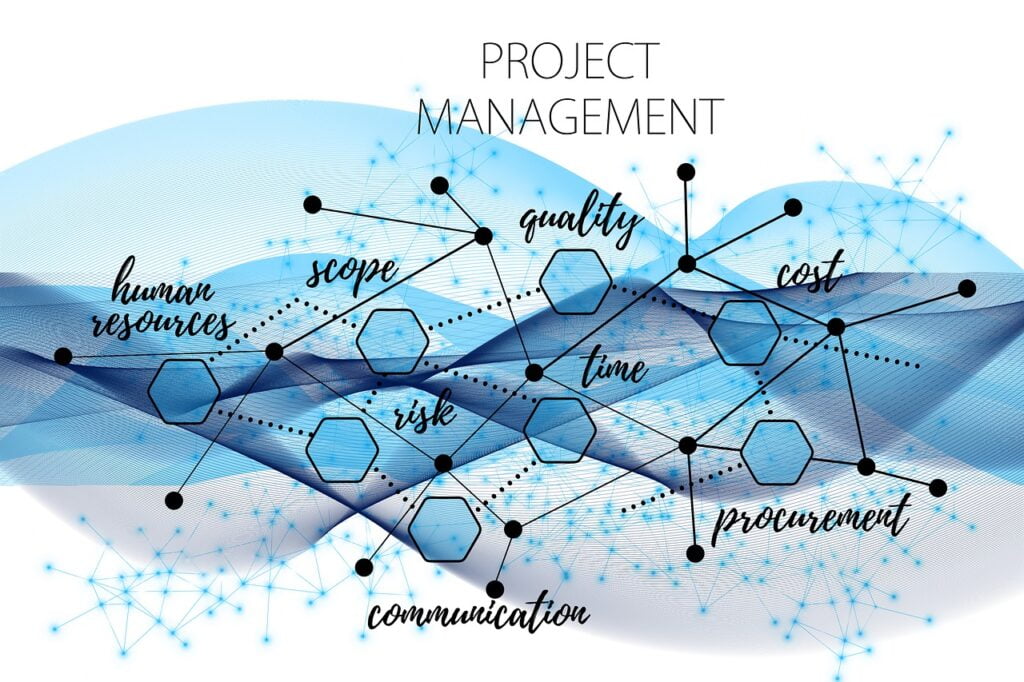Project management is a key factor in ensuring the success of any project. In every project, multiple roles and their responsibilities take the front seat. Knowing the roles on a project team, specifically, project team roles and responsibilities, is vital. This guide will help you navigate through the who’s who of project management.
Understanding Different Project Team Roles
The success of any project heavily relies on the team behind it. Project teams consist of individuals with diverse skills, expertise, and roles that contribute to achieving the project’s objectives. Understanding these different roles and how they fit into the project’s ecosystem is essential for effective teamwork and project management.
Breakdown of Common Roles and Their Contributions
- Project Manager: As previously discussed, the project manager plans, executes, and closes the project. They are the glue that holds the project together, managing timelines, resources, risks, and stakeholders.
- Business Analyst: They are responsible for understanding and translating business needs into project requirements. By bridging the gap between the business side and technical teams, they ensure the project aligns with the organization’s objectives.
- Project Coordinator: Usually assisting the project manager, the project coordinator handles administrative tasks, such as scheduling meetings, updating project documents, and communicating tasks and deadlines.
- Technical Team Members: These include software developers, engineers, technical writers, and other specialists who apply their technical skills to achieve the project’s deliverables.
- Quality Assurance (QA) Specialists: QA specialists are critical in assessing the quality of the project outputs. They conduct tests and reviews to ensure the final product meets all requirements and standards.
- User Experience (UX) Designers: For projects involving product development, UX designers play a crucial role in ensuring the product is user-friendly and meets the needs of the target audience.
- Subject Matter Experts (SMEs): SMEs provide in-depth knowledge and expertise in specific areas crucial to the project. Their insights can help shape project strategies and inform critical decisions.
How Roles Can Vary from One Project to Another
Not all projects will involve each of these roles, and sometimes individuals may wear multiple hats, especially in smaller teams or organizations. The project’s scope, complexity, and the organizational structure influence the composition of project teams. For instance, a large-scale IT implementation project will have different role requirements compared to a marketing campaign project.
The Importance of Defining Clear Roles and Responsibilities
Clear definitions of roles and responsibilities are crucial for project success. It helps in:
- Avoiding Conflicts: When team members understand their roles, there’s less likelihood of stepping on each other’s toes or disputes over responsibilities.
- Efficiency: Clearly defined roles lead to better workflow as everyone knows what they need to do, leading to increased productivity and efficiency.
- Accountability: When responsibilities are clear, it’s easier to hold team members accountable for their contributions to the project.
In conclusion, a deep understanding of the different roles within a project team and how they contribute to achieving project objectives is vital. By ensuring these roles are well-defined and aligned with the project’s needs, organizations can foster a more cohesive and productive project team, poised for success.

Role of a Project Manager
The project manager forms the backbone of any project, bridging the gap between the project’s strategic objectives and the tactical execution by the team. As the central figure in project management, a project manager’s role is multifaceted, encompassing a wide range of responsibilities that are essential for the successful completion of a project.
Responsibilities and Importance in the Project
At its core, the project manager’s role involves planning, executing, and closing projects—defining the project’s scope, building a project plan, and ensuring that the project is completed on time, within budget, and to the required quality standards. This includes managing tasks such as schedule creation, resource allocation, risk management, and communication planning. A project manager must also effectively manage the expectations of stakeholders, which can include project sponsors, clients, and team members.
Challenges Faced and How to Overcome Them
Project managers regularly encounter challenges such as scope creep, resource constraints, and conflicting stakeholder interests. To overcome these challenges, successful project managers employ a variety of strategies:
- Effective Communication: Clear and regular communication with stakeholders and team members helps to align expectations, provide updates, and mitigate issues as they arise.
- Flexibility and Adaptability: The ability to adapt plans in response to unforeseen changes or challenges is crucial. This involves being open to modifying project scopes or timelines as necessary.
- Risk Management: Proactively identifying potential risks and developing mitigation strategies can prevent many issues from impacting project outcomes.
- Stakeholder Engagement: Keeping stakeholders engaged and informed helps to ensure their ongoing support for the project and can streamline decision-making processes.
Project Sponsor: The In-House Champion of The Project
The project sponsor role often goes unnoticed, but it’s a crucial catalyst in driving project success. This role represents the organization’s interests and is the champion of the project internally—often linking the project team with the higher management and stakeholders of the organization.
Detailed Explanation of the Role and Its Significance
A project sponsor is typically a senior member of the organization who has a strategic interest in the successful completion of the project. They act as a core decision-maker, providing guidance, eliminating potential roadblocks, and endorsing the project’s strategic alignment with the business’s objectives.
In many ways, the project sponsor serves as a shield for the project manager and the team, dealing with organizational politics and conflicts that could potentially derail the project. They play a critical role in approving major project decisions and changes, often wielding the power to control resources and influence the direction to align with the project’s higher purpose.
Collaboration between Project Sponsor and Project Manager
The relationship and collaboration between the project sponsor and the project manager are crucial in achieving project objectives. The project sponsor provides the necessary leadership and support to the project manager by endorsing their plan and decisions. Simultaneously, the project manager facilitates the project sponsor’s role by maintaining an open line of communication, providing regular updates, and seeking guidance when necessary.
This collaborative relationship, built on mutual respect and trust, can significantly influence the project’s strategic positioning within the organization, the degree of support it receives, and ultimately, its success.
Impact of an Engaged Sponsor on Project Success
The active involvement of a project sponsor can considerably improve the prospects of project success. An involved sponsor lends credibility to the project and increases its visibility within the organization, which leads to better resource allocation and stakeholder buy-in.
An engaged sponsor can ensure that the project’s objectives remain aligned with the organization’s strategic goals, even when the project manager’s focus might necessarily be more on tactical, day-to-day issues. In projects facing high degrees of ambiguity or risk, the project sponsor’s role as a guiding light and an effective decision-maker is pivotal.

Team Leaders within a Project Team
The presence of strong, effective team leaders within a project team is vital to the project’s success. Leaders play a notable role in directing efforts, fostering teamwork, and ensuring that the project objectives are met efficiently and effectively.
Role and Importance of Team Leaders
Role of Team Leaders:
- Guiding the Team: Team leaders provide direction and guidance to their team members, helping them understand their roles, responsibilities, and the project goals.
- Motivation: They motivate the team, maintain morale and create an environment conducive to high productivity and engagement.
- Communication: Leaders act as a communication bridge between the team and higher management or other stakeholders, ensuring that information is accurately and promptly conveyed.
- Conflict Resolution: Leaders are often the first point of contact for resolving disputes or conflicts within the team, ensuring issues are dealt with before they escalate.
- Decision Making: Team leaders often make key decisions that affect the team and the project, sometimes under significant pressure.
Importance of Team Leaders:
- Clarity of Purpose: Good leaders ensure that the team understands the project’s objectives and how their work contributes to achieving them.
- Resource Utilization: They are responsible for managing resources wisely, be it team members, time, or materials, to ensure optimal project progress.
- Performance Monitoring: Leaders regularly assess the team’s performance, identify areas for improvement, and implement measures to enhance productivity.
- Skill Development: Leaders identify and encourage skill development opportunities to improve team capabilities and adaptability.
- Innovation Encouragement: Encouraging innovation within the team can lead to better problem-solving and improved project outcomes.
Qualities of Effective Team Leaders
- Visionary: Great leaders have a clear vision for the project and can communicate it compellingly to their teams.
- Empathetic: They exhibit empathy and understand individual team members’ needs, which helps in creating a supportive work environment.
- Decisive: They are capable of making decisions swiftly and firmly when necessary, even in the face of uncertainty.
- Adaptable: Effective leaders are adaptable, capable of responding to changes in the project environment with agility.
- Inspirational: They lead by example, inspiring their team through their actions, commitment, and work ethic.
Developing Team Leaders
Identify Potential Leaders: Recognize individuals within the team who exhibit leadership qualities and could potentially take on leadership roles.
Provide Training and Development: Offer leadership training and development opportunities to hone their skills and prepare them for the responsibilities.
Offer Mentorship: Pairing potential leaders with experienced mentors can provide them with valuable insights and guidance.
The Necessity of a Project Management Office
A Project Management Office (PMO) is a team or department in an organization that sets and enforces standards for project management. The project management office can assist the project manager in establishing a consistent approach to managing projects, providing guidance, and ensuring alignment with organizational goals.
For large companies handling multiple projects, a PMO can make a big difference in delivering success across all projects. They play a vital role in governance, compiling project data, and improving efficiency in project management.
Supercharging Project Delivery with a Project Management Consultant
A project management consultant is an external expert who offers to advise to help the project manager and the project team improve their performance. They bring their project management expert knowledge to identify potential issues, suggest enhancements, and implement optimal project management methodologies.
A project management consultant can elevate the project team’s performance, leading to more successful project outcomes. Simply put, they supercharge project delivery.
The Links in the Chain: The Importance of Team Structure
A well-defined team structure can improve team collaboration and keep any project running smoothly. As each project team is composed differently, understanding the team structure and roles of every team member is essential for project success.
The structure includes the hierarchy of the management team, starting from project sponsors to project managers to team leaders, and finally, to the project team. The structure is highly relevant to the project’s success since it enables clear communication paths and defines project team roles and responsibilities in the context of the specific project.
Final Words: The Team Behind Project Success
Clearly defining roles and responsibilities within a project team is crucial for efficient and effective execution of project deliverables. It helps to keep the project in check, on schedule, and within the scope defined in the project charter.
Remember, a successful project IS an all-out team effort. The project manager, project sponsor, team members, and even the project management consultant, all have to come together and work effectively for the success of the project.
Take the time to ensure you have the right team in place, with clear roles and responsibilities for everyone involved. Then sit back and watch as your team takes the project from a high-level idea to a completed success. Now, with this comprehensive guide at hand, you’re ready to go forward and conquer your project challenges!


